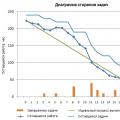Project manager: job description, rights and obligations
When starting a new project, top management necessarily determines who is responsible for its planning and organization of work. This position has many names that are mentioned in theory and practice. The most common is the "project manager". Let us dwell in detail on his duties, the nuances of the profession and the difficulties.
Position "project manager". How and by whom is it appointed?
The project manager is vested with the appropriate authority by the investor, customer or general contractor. He deals with the management of all phases and processes, including the coordination and control of any actions of the participants. Naturally, the manager has full responsibility for project management. A contract is concluded with a specialist, which spells out the main functions, duties, responsibilities and, of course, the payment system.
Such an applicant is rarely invited from outside, most often it is an employee of this company. Let us dwell on the advantages and disadvantages of such appointments.
Pros and cons of appointing "your" project manager
The advantages of such a solution are obvious.
- First plus. The employee knows and understands the specifics of the business of this company, as they say from "A" to "Z".
- Second plus. He has well-established connections and relationships in the company with employees, transparent ways of influencing and lobbying. Therefore, employees will feel more comfortable and emotionally calm with "their" manager.
- Third merit. You can offer a “own” employee a lower salary than a “foreign” applicant. This difference is compensated by the fact that he receives a clear promotion.
Cons of appointing a project manager from "their own".
- Firstly, such an employee of the company, as a rule, has a narrower, more familiar and “blurred” view of the current situation and the current project.
- Secondly, the applicant from "their own" has a small distance with the future team. Therefore, often the future hierarchical relations "leader-subordinate" in the process of work do not always add up.

Thirdly, it is difficult for "his" employee to consider this project comprehensively and objectively. He usually begins to lobby for local interests, being influenced by formal or informal groups. And most often he belongs to one of them.
Pros and cons of appointing a "foreign" project manager
The following advantages can be distinguished.
- Firstly, the presence of a “non-soapy”, fresh and comprehensive view of the proposed project and this business.
- Secondly, an outside employee has no relationship with the future team. Therefore, he has the opportunity to take leadership positions.
- Third, there is a choice among professionals in the field of management. Currently, the labor market can offer a huge number of specialists in the required field with the appropriate education and work experience.
- Fourth, such a leader will be able to attract new connections and certain opportunities.
Disadvantages of appointing a project manager from outside.
- Firstly invited from the outside does not always know the business and understand its specifics.
- Secondly, the employee does not know the team, the system of relations and ways of influencing it. The manager will need additional time to get comfortable and prove himself. Moreover, as a rule, he will strive to bring "his" people to the team and attract existing connections.

Thirdly, the invited manager usually needs to pay more. The most important thing is that the financial costs are compensated by the end result.
Tasks of the project manager
Let's dwell on the main ones.
- Firstly, the job of the "project manager" is to prepare the management plan, organize the planning and continuously adapt the current process.
- Secondly, he must control the schedule; plan resources, finances, quality; manage prospects and risks.

- Third, project management includes, of course, their implementation and completion. The manager must carry out the project's PR and marketing, as well as create credibility for it.
Specialist Responsibilities
The project manager must:
- interact with their immediate superiors, departments and structures, the team as a whole and individual team members involved by the performers;
- ensure contacts with external structures (customer, sponsor, contractors, contractors, suppliers);
- maintain an efficient infrastructure and management system;
- prepare reports and supervise documentation.
 In more detail, the responsibility, functions, rights and obligations that the project manager must perform, the standard instruction contains. Naturally, it can always be supplemented.
In more detail, the responsibility, functions, rights and obligations that the project manager must perform, the standard instruction contains. Naturally, it can always be supplemented.
Challenges of a project manager
In practice, the manager has to solve many problems.
- Firstly, the project manager is fully responsible for the final result. But, at the same time, he does not have sufficient authority to manage personnel and resources.
- Secondly, he is obliged to respond in a timely manner to any deviations and errors in the process of project implementation, making the necessary changes.
- Third, the manager's powers and activities are not finally defined. These items are constantly adjusted depending on the uniqueness of the project, emerging constraints and risks. Moreover, this specialist is engaged in the coordination and integration of all actions.
- Fourth, the manager often has communication difficulties due to the large number of parties involved in the project. This is the immediate supervisor, the customer, the project team, the public. Traditionally they have different interests.
- Fifth, usually unforeseen organizational and technical difficulties pop up daily. One of the most common is that suppliers and contractors violate their obligations.
Therefore, this is a very difficult position - the project manager. Responsibilities are numerous, and powers and opportunities are blurred.
Job applicant requirements
The main criteria are the following.
This specialist must have experience and knowledge of managerial work. The ideal option would be if the applicant has worked in the core area for several years and has mastered the practical skills of project management. Preference is usually given to managers with higher economic or technical education. Naturally, a specialist must be motivated and understand what he will work for.
Auxiliary qualities are the following: the possession of leadership qualities, the ability to manage conflicts and the ability to work on a personal computer.
What should a project manager be able to do?
- Firstly manage yourself in stressful situations. A specialist will have many different duties, but few opportunities and powers.
- Secondly, the manager is responsible for cross-functional tasks. He needs to understand different areas of activity in order to advise employees, monitor and evaluate them.

- Third, the work of such a specialist is dominated by non-standard, innovative activities, which as a result should lead to the achievement of final goals.
- Fourth, he needs to be able to resolve conflicts in interactions with people.
Features of the work of the project manager in construction
This specialist is responsible for the successful flow of the processes of initiation, planning, execution and closing of the project in construction.

A manager must possess a number of general skills. We are talking about the ability to resolve interpersonal conflicts, to have the skills of planning, management and control. In addition, there are specific skills.
The project manager in construction must understand that his activities will be directly related to risk throughout the work. It occurs, as a rule, in a situation of uncertainty. The manager must reduce risks, regulate the emotional state of the team and take full responsibility for all his decisions. It is these provisions that determine, as a rule, how successful the project manager will be. Responsibilities are outlined in a standard job description.
Project managers in construction use software very often. Thanks to this, you can more effectively organize your activities and areas of work of employees. The software will allow the manager to receive a report and a plan within a couple of minutes, and will save him from complex calculations.
Conclusion
Therefore, the job of a project manager is not as easy as it seems at first glance. The specialist needs to be stress-resistant enough to perform a number of mandatory activities.
- Firstly, the manager plans activities and their sequence, and also determines the amount of work required.
- Secondly, he paints the budget, allocates resources, develops a schedule, estimates the time and cost of each stage.
- Third, the duties of the manager include monitoring employees and the quality of work, analyzing and managing risks.
- Fourth, the manager maintains documentation, is responsible for communication with superiors and clients.
- Fifth He must take the lead in all matters.
However, one important fact must be taken into account.
To be successful, the project manager must gain the support and authority of senior management.
 Discounted payback period
Discounted payback period Methodological aspects of project management
Methodological aspects of project management Scrum Development Methodology
Scrum Development Methodology